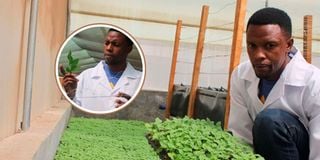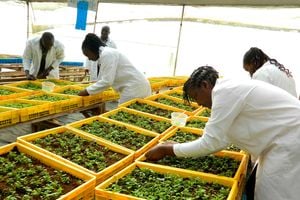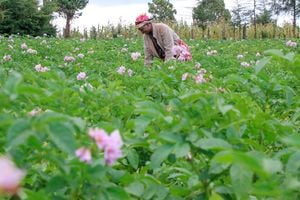
Mr Joseph Gachunge, who is in charge Ol Joro Orok ATC potato propagation farm.
As early as 6am every Tuesday and Thursday, trucks divert to the left from Nyahururu towards Ol Kalou, something residents are used to.
The destination is Ol Joro Orok Agricultural Training College (ATC) where they get parcels that must be delivered by the designated time. The parcels are delicate, perishable and meant for planting.
Among the early arrivals is Joseph Muiruri, a potato farmer and seed multiplying expert. He is here to pick a batch of planting materials. To get served on time, Muiruri has to be up by 5am and drive the 40 kilometres from his Rurii home to the college.
Others are from as far as Bungoma, Mwingi and even Rwanda.
Ol Joro Orok ATC has risen from the ashes to become a champion and reliable source of certified potato seeds and seedlings.
“Few people thought about the ATC, especially after devolution in 2013. O Joro Orok ATC was among the many institutions that collapsed with the new system of governance. It now makes us proud after reclaiming its glory,” Muiruri says.
The institution has become a reliable supplier of potato seed. The aim is to reduce the gap to accessible clean potato planting materials, which stands at five per cent, according to the Kenya Institute for Public Policy Research and Analysis (KIPPRA).
The 2023 survey shows that the uptake of certified seeds is low – just two per cent of the 800,000 smallholder potato farmers. The rest use recycled seeds.
Apart from the high cost of production, experts blame the stagnated growth of the crop on lack of clean planting materials.
KIPPRA says production has stagnated at seven tonnes per hectare, against a potential of 40 tonnes, despite potatoes being listed second staple food in Kenya after maize.
Efforts by Ol Joro Orok ATC to address seed shortage have attracted local and international players in food security and agribusiness. Among them is the European Union, which has built and equipped a seed propagation laboratory and seed storage coldroom for Sh116 million.
Ol Joro Orok ATC Potato Seed Multiplication Unit head, David Kuria, admits that the cost of clean planting material is a challenge to farmers.
“The number of growers interested in clean planting material is high but the cost of producing them is also high. Still, we cannot meet the supply and demand,” Kuria says.
“Our fully equipped cold store is under-utilised as the seeds are booked in advance. We are in a situation where might have to book up to three months in advance. We can only sell to contracted large-scale farmers who then make the seeds available to smallholders.”
Kuria says an acre requires 20 bags of 50kg bag, with one bag going for Sh4,000.
“The devolved government of Nyandarua has come up with sustainable seed multiplication for farmers. There are two methods – use off mini tubers and apical cuttings,” he says.
With apical, potato cuttings are developed from tissue culture plantlets. Rooted apical cuttings are gaining popularity. If one intends to plant five acres, he buys materials for half an acre. A farmer requires 20,000 seedlings for an acre, every seedling retailing at Sh5. These are enough to produce seeds for 10 acres.
With the clean planting materials at Sh4,000 a bag, a farmer will spend Sh800,000 for 10 acres.
The contracted farmer sells the generated seeds to the college, which are then sold to small-scale farmers. To qualify for contract farming for seed multiplication, one must have at least five acres for rotational purposes. The process is closely monitored by the ATC and the Kenya Plant Health Inspectorate Service.
Kuria says with the interventions, it will take about five years for small-scale farmers to feel the availability of the seeds. For that to be achieved, the ATC would need 60 greenhouses, up from the current five, which makes the lab and the coldroom storage underutilised.
“We need to contract as many farmers as possible for the target is 10,000 acres. To address the shortage, we are talking to institutions with large tracts of land. We have already engaged Eldoret University Laikipia Campus, Egerton University and Karatina University,” Kuria says.
“They will get planting materials from us. We target an average of 5,000 acres from the universities while the remaining will be from large-scale farmers.”
Muiruri is among the farmers embracing apical and mini-tubers. He says mini-tubers give him 35 to 45 clean seeds. These can be replanted for up to four seasons.
He says apical are better than mini-tubers since they are available on booking. For mini-tubers, a farmer must wait for the college to generate the seeds.
“I order apical cuttings with a timing of 21 days to planting. Apical cuttings have up to six generations compared to mini tubers that have four,” Muiruri says.
Apical production is higher, producing 25 to 35 mini-tubers. When planted, a cutting produces 35 to 45 tubers. This technology is reliable as one can get seeds when needed. A farmer can get the quantity of seeds required.
“A pack for mini-tubers has 100 seeds while a tray of main tubers has 200 seeds. This is affordable by large and small-scale farmers. The other advantage with the ATC is that farmers are trained there before planting,” he says.
Muiruri, who has 10 acres under seed multiplications, says the seeds produce three times better than recycled materials.
On average, the recycled seeds produce 20 to 30 bags of potatoes while clean materials produce more than 100 bags per acre and up to 150 bags with the best agronomy practices.
ATC agronomists and trainers make follow-ups to ensure success. Muiruri encourages potato farmers to partner with the college.
Ol Joro Orok ATC Principal, Muchai Maina, says the core mandate of the institution is to train farmers to address agricultural gaps.
He says it has recorded increased visitors – learners and in agri-tourism.
“We have had to expand the training facilities to accommodate the increasing number of visitors. Demand has made us introduce new packages for families. Visitors come with their children to interact with farming activities. We receive children who have never interacted with livestock and crops,” Maina says.
Florence Njeri, the training coordinator, attributes the success of the college to a conducive working environment.
“Being here used to be boring. We now need additional workers as the place is always busy. Our 10 cows have multiplied to 30. We have introduced rabbits and dairy goat farming for training purposes,” she says.
“Visitors enjoy food grown at the college. It is exciting for them to witness and enjoy vegetables harvested directly from the farm, milk from cows and so on.”
Apart from the training, the institution has introduced three exhibitions in a year.
Nyandarua Agriculture Executive, Francis Miring’u, says the college resurrected after being given financial autonomy.
“The institutions used to generate money for devolved government without getting anything in return. They can now spend money generated to finance their activities,” he says.
“Getting training funds was a long bureaucratic process that would take months. That is now a thing of the past.”
He says Governor Kiarie Badilisha has banned devolved government meetings and trainings being conducted outside the county. They must be held at Ol Joro Orok or Njabini ATCs.
Other government entities, NGOs, and private organisations have followed suit.









